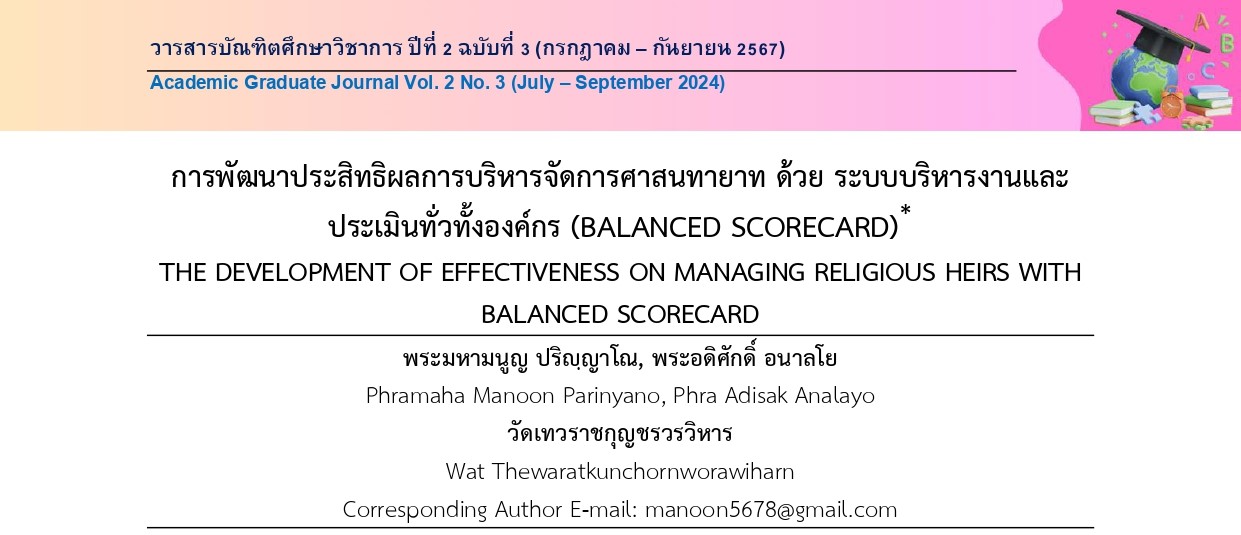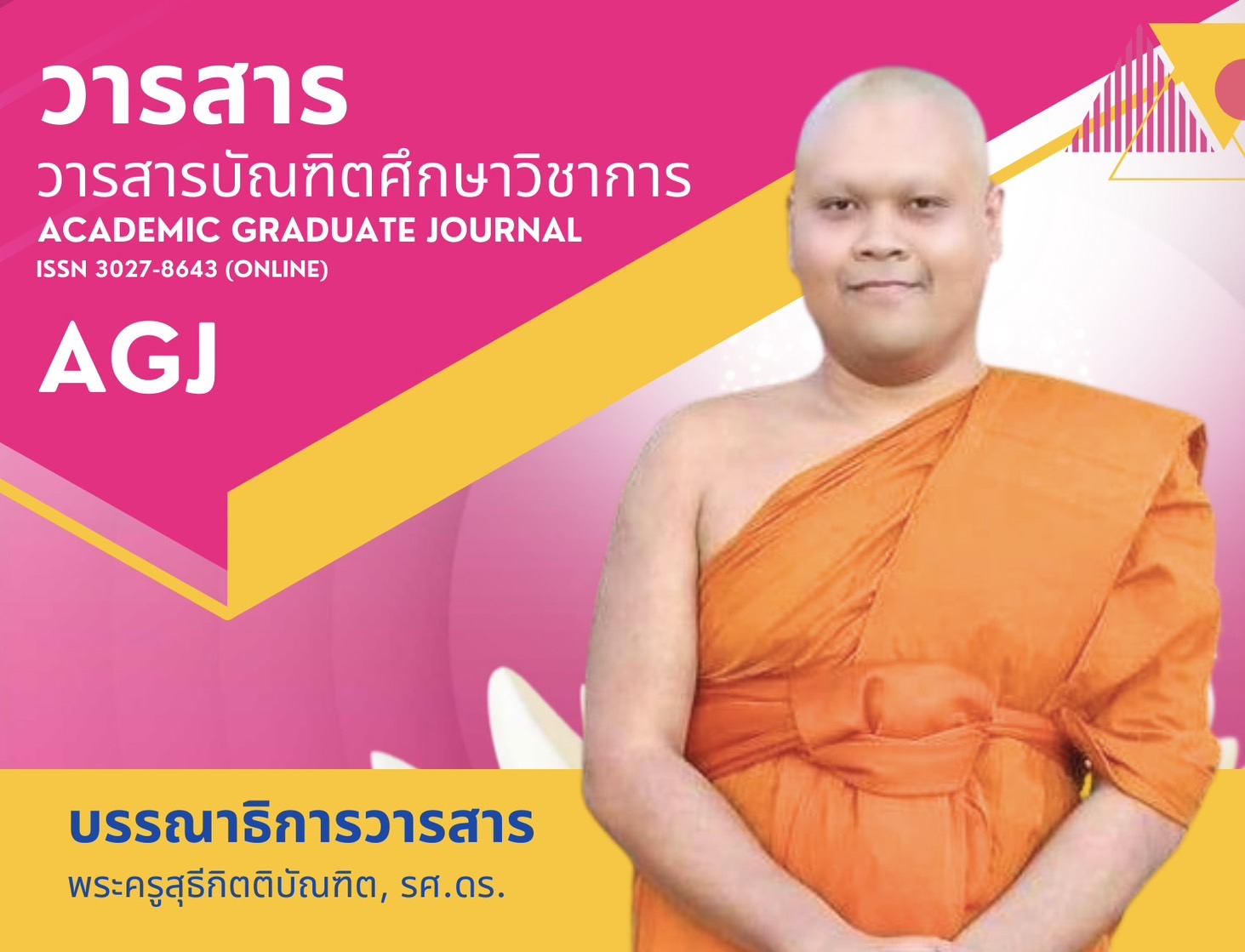การพัฒนาประสิทธิผลการบริหารจัดการศาสนทายาท ด้วย ระบบบริหารงานและประเมินทั่วทั้งองค์กร (BALANCED SCORECARD)
คำสำคัญ:
การพัฒนา, ศาสนทายาท, ระบบบริหารงานและประเมินทั่วทั้งองค์กรบทคัดย่อ
การศึกษาเรื่องการพัฒนาประสิทธิผลในการบริหารจัดการศาสนทายาทมีความสำคัญอย่างมาก ในการปรับปรุงระบบการบริหารจัดการเพื่อให้มีประสิทธิผลมากยิ่งขึ้น บทความนี้ได้นำเสนอแนวคิด ทฤษฎี และงานวิจัยที่เกี่ยวข้องเพื่อเสนอแนวทางการพัฒนาประสิทธิผลในการบริหารจัดการศาสนทายาท ปัจจุบันพระพุทธศาสนามีจำนวนพระภิกษุ สามเณรลดน้อยลง สาเหตุหลักมาจากการเปลี่ยนแปลงทั้งทางสังคมและสภาพเศรษฐกิจ ปัจจุบันครอบครัวมีขนาดเล็กลง มีบุตรชายลดลง จึงหลีกเลี่ยงให้ลูกชายเข้าบวชเพราะการหน้าที่ที่ต้องรับผิดชอบ และทางสังคมมีแข่งขันที่สูงขึ้น วิธีการที่องค์กรทางศาสนาสามารถรองรับการเปลี่ยนแปลงนั้นคือการพัฒนาประสิทธิผลการบริหารจัดการอย่างต่อเนื่องและมีประสิทธิภาพ โดยการใช้เครื่องมือและเทคนิคที่เหมาะสมในการวัดและประเมินผลการดำเนินงานเป็นสิ่งสำคัญในการพัฒนาประสิทธิผล การพัฒนาประสิทธิผลในการบริหารจัดการไม่เพียงแต่เกี่ยวข้องกับกระบวนการภายในองค์กรเท่านั้น แต่ยังต้องพิจารณาถึงผลกระทบต่อสังคมและสิ่งแวดล้อมที่รอบข้างด้วย ระบบบริหารงานและประเมินทั่วทั้งองค์กร (Balanced Scorecard) เป็นเครื่องมือที่สำคัญในการจัดการองค์กรที่มีผลกระทบต่อการวางแผน การดำเนินงาน และการวัดผลในมุมมองที่สมดุล แนวคิดหลักคือการนำเสนอวิธีการวัดและประเมินผลการดำเนินงานขององค์กรที่ไม่ได้เน้นเฉพาะด้านการเงินเท่านั้น แต่ยังรวมถึงมุมมองด้านกลยุทธ์ ลูกค้า กระบวนการภายใน และการพัฒนาองค์กรอย่างรวมถึงการระบุเป้าหมาย การติดตาม และการวัดผล การนำเครื่องมือด้านการบริการจัดการ ดังเช่น ระบบบริหารงานและประเมินทั่วทั้งองค์กร (Balanced Scorecard) ยอมเป็นส่วนช่วยเสริมแนวคิดด้านการพัฒนาการบริการจัดการศาสนทายาทให้มีความชัดเจนและได้ประสิทธิผลมากขึ้น หากแต่ต้องมีความเข้าใจในเครื่องมืออย่างเชี่ยวชาญ
เอกสารอ้างอิง
จักรวาล สุขไมตรี. (2557). รูปแบบการพัฒนาทรัพยากรมนุษย์ตามแนวพุทธจริยธรรมระดับอุดมศึกษา (ดุษฎีนิพนธ์ปริญญาพุทธศาสตรดุษฎีบัณฑิต สาขาวิชารัฐประศาสนศาสตร์). พระนครศรีอยุธยา: มหาวิทยาลัยมหาจุฬาลงกรณราชวิทยาลัย.
ชัยยุทธ ชิโนกุล. (2556). กลยุทธ์การฝึกอบรมและพัฒนาพระภิกษุสามเณรในจังหวัดชายแดน (ดุษฎีนิพนธ์ปริญญาพุทธศาสตรดุษฎีบัณฑิต สาขาวิชารัฐประศาสนศาสตร์). พระนครศรีอยุธยา: มหาวิทยาลัยมหาจุฬาลงกรณราชวิทยาลัย.
โชติ บดีรัฐ. (2555). การบริหารงานของพระสังฆาธิการ ในเขตการปกครองคณะสงฆ์ภาค 4 เพื่อความมั่นคงแห่งพระพุทธศาสนา. สักทอง : วารสารมนุษยศาสตร์และสังคมศาสตร์, 19(1), 25-35.
ณัฐชนันตร์ อยู่สีมารักษ์. (2557). รูปแบบการพัฒนาทรัพยากรมนุษย์ตามหลักพุทธธรรมของสถานศึกษาของรัฐ สังกัดกรุงเทพมหานคร (ดุษฎีนิพนธ์ปริญญาพุทธศาสตรดุษฎีบัณฑิต สาขาวิชารัฐประศาสนศาสตร์). พระนครศรีอยุธยา: มหาวิทยาลัยมหาจุฬาลงกรณราชวิทยาลัย.
ไทยพีบีเอส. (2562). จำนวนพระภิกษุ - สามเณร 14 ปีย้อนหลัง. สืบค้น 1 พฤษภาคม 2567, จาก https:// www.thaipbs.or.th/news/infographic/227.
นครินทร์ แก้วโชติรุ่ง. (2556). รูปแบบและหลักการของการปกครองในพระไตรปิฎก (วิทยานิพนธ์พุทธศาสตรดุษฎีบัณฑิต สาขาพระพุทธศาสนา). พระนครศรีอยุธยา: มหาวิทยาลัยมหาจุฬาลงกรณราชวิทยาลัย.
พระมหาทวี วิสารโท. (2560). การบวชเป็นศาสนทายาทในพุทธศาสนาแบบเถรวาท. วารสาร มจร สังคมศาสตร์ ปริทรรศน์, 6(1), 15-26.
Alavi, M. & Leidner, D.E. (2001). Review: Knowledge Management and Knowledge Management Systems: Conceptual Foundations and Research Issues. MIS Quarterly, 25(1), 107–136.
Davenport, T.H. & Prusak, L. (1998). Working knowledge: How organisations manage what they know. Boston: Harvard Business Press.
Deming, W.E. (1986). Out of the Crisis. Cambridge, Massachusetts: MIT Press.
Freeman, R.E. (1984). Strategic Management: A Stakeholder Approach. Boston: Pitman.
Juran, J.M. & Gryna, F.M. (1988). Juran's Quality Control Handbook. McGraw-Hill.
Kaplan, R.S. & Norton, D.P. (1993). Putting the Balanced Scorecard to Work. Boston: Harvard Business Press.
Kaplan, R.S. & Norton, D.P. (1996). The balanced scorecard: Translating strategy into action. Boston: Harvard Business Press.
McLeod, R. & Schell, G. (2007). Management information systems. New Jersey: Prentice Hall.
Neely, A. et al. (2002). The performance prism: The scorecard for measuring and managing business success. Financial Times. New Jersey: Prentice Hall.
Nonaka, I. & Takeuchi, H. (1995). The knowledge-creating company: How Japanese companies create the dynamics of innovation. Oxford: Oxford University Press.
Schein, E.H. (1985). Organizational culture and leadership. San Francisco: Jossey-Bass.







